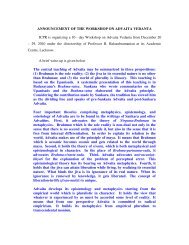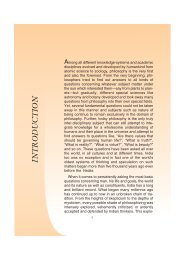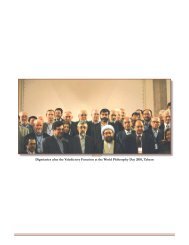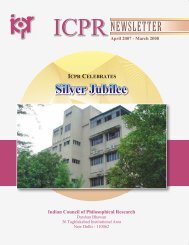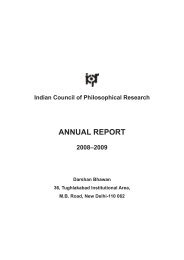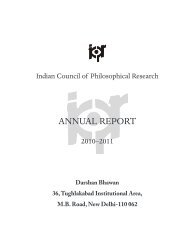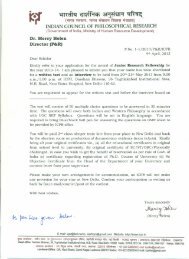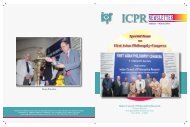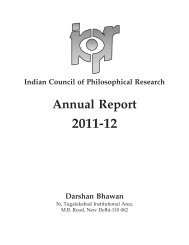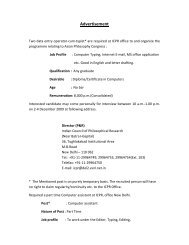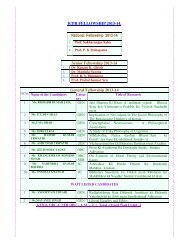Newsletter - Indian Council of Philosophical Research
Newsletter - Indian Council of Philosophical Research
Newsletter - Indian Council of Philosophical Research
Create successful ePaper yourself
Turn your PDF publications into a flip-book with our unique Google optimized e-Paper software.
the knowledge <strong>of</strong> ourselves and <strong>of</strong> the external world.<br />
Therefore, Gandhian studies are among the thrust<br />
areas, the ICPR is encouraging.<br />
Another challenge before us is the extra-ordinary<br />
diversity manifest in many ways in the country. It can<br />
be a boon to build a colourful coalition <strong>of</strong> coexisting<br />
identities and make India a showcase <strong>of</strong> sustainable<br />
pluralism. Or it can bust the very integrity <strong>of</strong> the<br />
nation. I believe, we philosophers can develop appropriate<br />
models to analyze this complex situation and<br />
find ways <strong>of</strong> moving in the desirable directions.<br />
Ours is not merely a nation <strong>of</strong> wide diversities. It is<br />
a country <strong>of</strong> great contrasts and deep paradoxes. We<br />
have been living with them. Mr. Prime Minister, Sir,<br />
if I may take the liberty to say so, you yourself is an<br />
example <strong>of</strong> a striking paradox. You are not a politician<br />
by instinct or training. Yet, you are the elected Prime<br />
Minister <strong>of</strong> the largest democracy in the world. Again,<br />
the country is arguably one that scores high on corruption.<br />
Our integrity rating is said to be as low as 3.3 on a<br />
scale <strong>of</strong> 10. The recently concluded Common Wealth<br />
Games are a painful reminder. Yet, we have in you a<br />
Prime Minister who is globally acclaimed for impeccable<br />
integrity scoring 10 on 10. As Bill Burns so aptly<br />
observed the other day, on the occasion <strong>of</strong> presenting<br />
the best world statesman award to you, “there could<br />
be no better choice, no better model <strong>of</strong> what integrity<br />
and statesmanship are all about on the world stage.”<br />
Behind the silky layer <strong>of</strong> your gentle demeanour and<br />
rare humility, sometimes mistakenly taken as weakness,<br />
lie your real strength, the steely determination,<br />
long term vision and wisdom guided action.<br />
I mention paradoxes here because paradoxes are the<br />
play fields <strong>of</strong> philosophers. The history <strong>of</strong> philosophy<br />
is itself a story <strong>of</strong> playing with paradoxes such as<br />
seeking being in nonbeing, searching for permanence<br />
in the midst <strong>of</strong> change, striving for knowledge and<br />
bliss while seeing that we are situated in a state <strong>of</strong> ignorance<br />
and suffering. Classical <strong>Indian</strong> philosophy is a<br />
relentless pursuit to dissolve such paradoxes. Indeed,<br />
it is a characteristic <strong>of</strong> <strong>Indian</strong> tradition to bring about<br />
a magical synthesis <strong>of</strong> contraries.<br />
Philosophy began as a search for the “really real”, to<br />
learn about the reality behind appearances. Thus, it was<br />
the mother <strong>of</strong> all sciences. At the time <strong>of</strong> Plato and<br />
Aristotle physics was a part <strong>of</strong> philosophy. However,<br />
with the emergence <strong>of</strong> specialized sciences, philosophy<br />
finds itself empty and barren <strong>of</strong> subject areas<br />
to study. Ontological metaphysics itself has come to<br />
be seen increasingly, to quote the American philosopher,<br />
C.S.Pierce, “either meaningless gibberish” or<br />
else “downright absurd.” So, we find philosophers<br />
move away from the search for the “really real” and<br />
focus their attention on concepts and their meaning.<br />
Finding conceptual confusions and clearing them have<br />
become the subject-matter <strong>of</strong> philosophy. Philosophers<br />
have become self-certified therapists to treat<br />
confused minds and clear the congested cognitive<br />
systems. This has served its purpose and the limitations<br />
<strong>of</strong> this approach have now become all too<br />
obvious. Philosophy is on the threshold <strong>of</strong> a new<br />
evolutionary phase.<br />
Philosophy deals with ideas and their legitimacy. There<br />
are several criteria by which the legitimacy may be<br />
assessed. What is “agreeable to reason” is just one <strong>of</strong><br />
them. Others include those that are (a) aesthetically<br />
appealing, (b) emotionally satisfying, and (c) morally<br />
imperative. All these are driven crucially by cultural<br />
factors and not given a priori as unalterable and absolute<br />
rules dictated by reason and logic. Man does not<br />
live by reason alone. One’s thirst is not quenched by a<br />
dose <strong>of</strong> logic, but a glass <strong>of</strong> water. Hunger is not overcome<br />
by a rational understanding <strong>of</strong> its causes. A man<br />
is not relieved <strong>of</strong> his grief by syllogistic reasoning but<br />
by comforting counsel and empathy. The existential<br />
conditions not only precipitate problems, philosophical<br />
or otherwise, but also provide their plausible<br />
solutions.<br />
What are really real are not some eternal truths but<br />
existential problems. These are more than semantic.<br />
Philosophers need to go beyond linguistic analysis and<br />
clearing conceptual confusions. They should address<br />
the problems <strong>of</strong> life and living. Thoughts that are not



